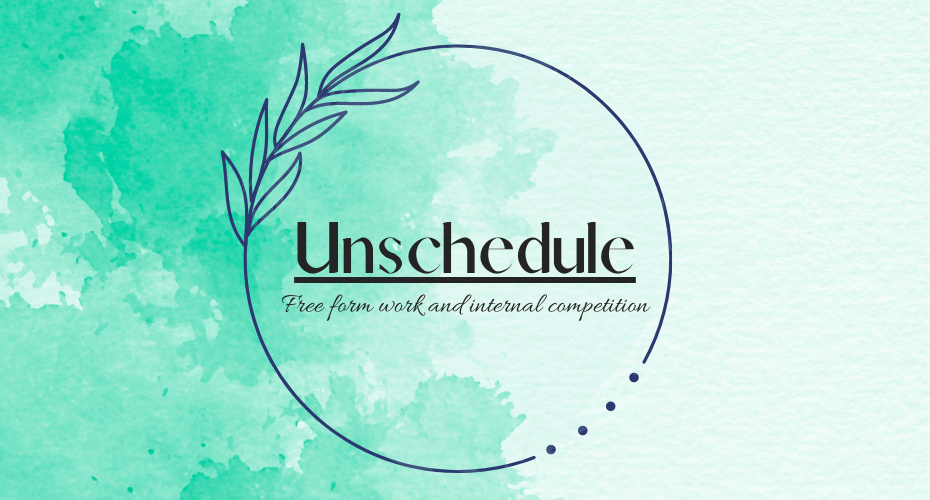
Before I get into this, I want to say that I think the classical schedule is probably best for most people. It’s cleaner, more predictable, and easier to hit larger goals on a strict timeline. I would recommend giving normal schedules a serious try before resorting to this kind of system. That said, I think artists especially have a hard time with consistency. There’s a reason we have a stereotype for being flaky daydreamers that talk a bigger game than we often bring. The gift that makes us so creative is also the curse that tends to strand us in the wasteland of unrealized prospects.
Unnecessary Backstory (Scroll Down To Skip The Ramble)
When I was a teenager, I would try to follow a schedule. I’d make a new one every few months, and stick to it for about a week or two before it imploded on itself over, and over, and over again. I’ve tried just about every method; calendars, to-do lists, time-blocking, and even money incentives, for which I would award myself spending money for doing more tasks. Somewhat unfortunately, I hate spending money on myself, so that system inevitably went nowhere. Nothing worked. It was a vicious cycle of leaping and crashing… and often burning to follow as my failure in this zero-sum game drug me down into depressive ruts.
It didn’t help that I also set the bar of “success” at an excessive height because I was too stubborn to take baby steps. I was trying to match everyone else around me, or at least, what my idea of everyone else’s successes were; in other words, I was competing with them and their work ethic. For some people, competing with the outside world is the best way to push themselves to grow, but for me, someone with the default work ethic of an ancient sloth, it did nothing but make me feel pathetic, ineffective, and hopelessly behind. Looking at the gap between them and myself, I would usually just crawl back into my hole and give up, too fed up with the insane challenge I was setting up for myself.
Sometimes trying to set goals made me even more reluctant to work than having no goals at all, and so ironically, in my attempts to lay out a schedule, it was like I was pouring molasses in the path of my progress. As an example, before I made writing a “real goal”, I could whip out fifty thousand words on a project in three weeks without even thinking twice. That was when I wrote what manuscript I have of “Ancient Glories”, and it was partially that ease of writing (combined with my time DMing half a year later) that made me take the idea of writing seriously in the first place. Before that, when I was sixteen, I wrote about sixty thousand words in a couple of months, which was the beginning of the Venture Imperium series. Surely with that kind of speed as a mere rookie, I could easily take writing seriously, right?
Wrong.
As soon as I started structuring it in the necessary ways that would lead me to be a proper author, my word counts went through the floor, into the basement, and burrowed straight on down into the pits of the earth almost overnight. My monthly numbers actually went into the negatives as I edited out chunks of unnecessary story but couldn’t write more to fill the void they left. I think this is when I’d had enough of this stupid cycle, but I didn’t know how to fix the issue.
I’ve been trying to figure this out for over a decade now, frustrated with my inability to “be normal” and disappointed in my chronic lack of results and discipline. Perhaps part of that struggle came from being homeschooled, which meant I was not restrained by a day-in and day-out government-organized routine. Don’t take that as a complaint though, I’m very grateful that I was schooled the way I was, but the lack of timetables was a hang-up for me and my family.
I find strict routines and miles of deadlines on a calendar abysmal. I always have. It’s like they siphon my will to live if I so much as glance at one, but I couldn’t avoid that if I wanted to get things done… or maybe I could? Obviously, this whole “intensely conscientious routine” thing wasn’t working, so I started trying to find more open-ended solutions that didn’t result in the feeling of “winning” or “losing” outright.
Over the past twelve months, I’ve been developing a system that doesn’t make me want to light myself on fire every day, and the results have been so much more than what I’d hoped for, not to mention that this is the longest I’ve ever managed to hold onto any kind of steady success. In July, my best month so far, I got eight times more done than when I’d started in December of 2021. That’s a pretty big deal, and to add to this achievement, I’ve taken on several more avenues of interest, including music and experimentation with game development.
(As a bonus, it’s also proven that spending time on video games actually increases the effort I put into work, not decrease it. My best month, July, is also the month I played the second most hours on Minecraft and Divinity Original Sin 2. It violates the precepts established in popular thought, mainly that video games make you a lazy slob, but so does this entire Unscheduling idea.)
The System
Derived from more sources on the motivational side of Youtube than I can count (though with heavy influences from Jordan Peterson, a resource I would highly recommend), this system uses two simple programs; Mindly, and a graph spreadsheet, both of which are easily accessible and free on most operating systems. I use Apple, so I manage both from my phone and use the Numbers app it comes with. It’s really easy to set up, so don’t fret over technicalities.
Before I get into the programs themselves though, I’m going to talk about the categories you need to set up first.
I have five categories; Health, House, Work, Writing, and Arts. You can have more or less than five – or if you really wanted to, you could do this without categories, though I wouldn’t recommend it because it would get messy and discouraging in a hurry. Counting points is easier and more effective at staving off selective procrastination if done by groups than it is by individual tasks.
As you may have suspected, House contains all the chores, Health contains things like taking vitamins and stretching, Work contains tasks required by my stay-at-home work, Writing contains things like word goals and reading, and Arts contains things like music practice and 3D modeling.
I then put these categories and their tasks into Mindly like so:
[As you can see, at the time this picture was taken, I had yet to do a bunch of my tasks and so the categories are in varying shades of orange. Also, yes, I call it a skill tree because I was raised on pure video games.]
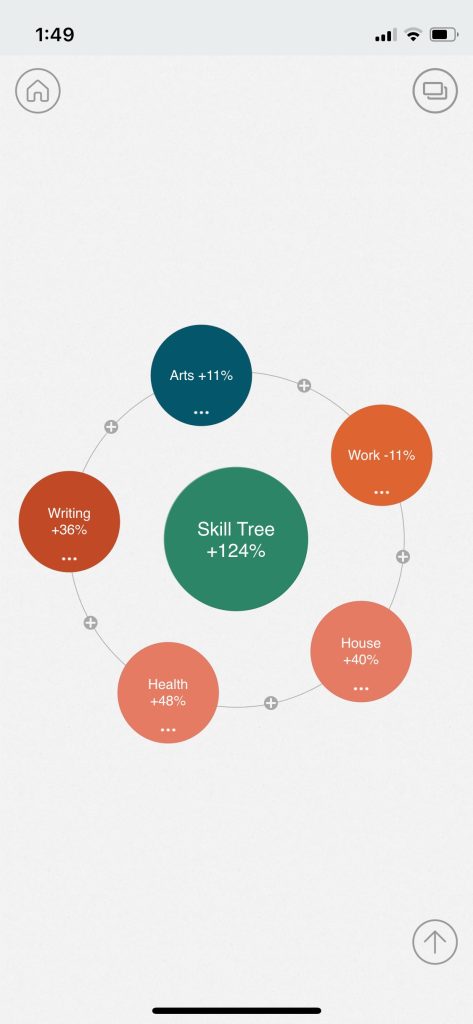
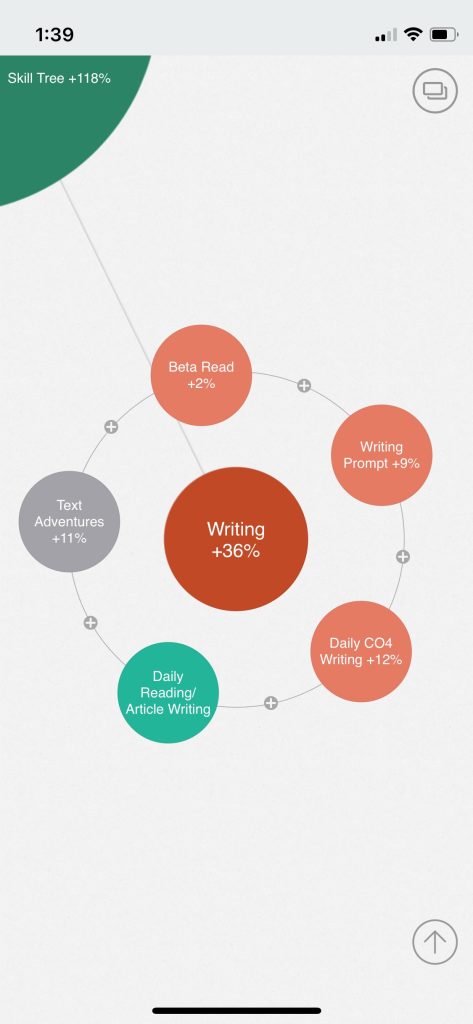
Once those were set, I marked tasks either orange or green — incomplete or complete. You could do it other ways, but Mindly isn’t exactly designed for the purpose I’m using it for here, so switching the colors is the fastest way to mark tasks. Many of my tasks are ones I do every other day, and so I mark those light green to remind myself to mark them orange the next day when I wake up and review my lists. Otherwise, I would often forget how many days it had been since I last did the task… because my brain is little more than frayed wires, I suppose.
If there are multiple incomplete tasks in a category, I mark that category a darker shade of orange. This way, I can tell what I’m most behind on by simply glancing at the home page and I don’t have to scroll through every section just to figure out what I need to prioritize. That said, I use a different system for the Arts category, knocking down each task by a shade of purple every morning so I can see how long I’ve gone without practice. If a task fades into the greys, I know it’s been more than a week since I attended to it.
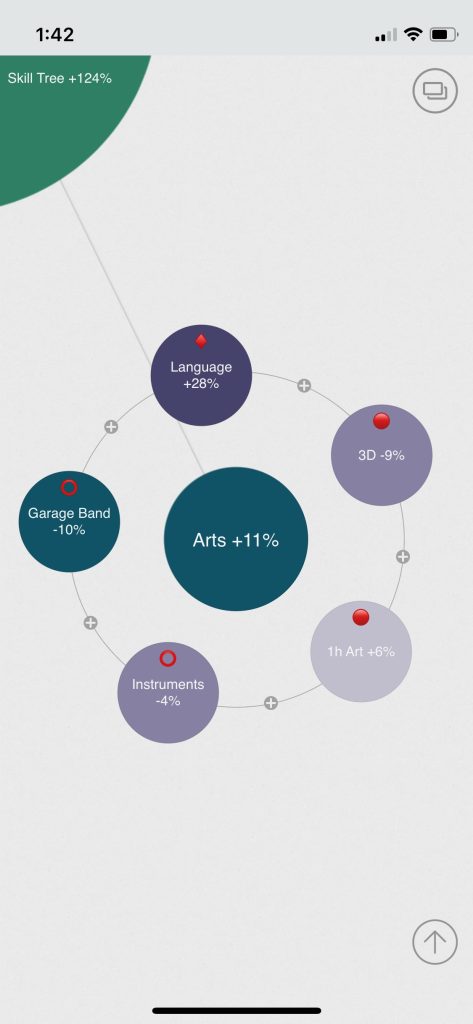
I know it all might seem a little silly with all these categories and colors, but silly or not, it’s been working, and that’s all I really care about at this point.
This is where the graph comes in. Personally, I add a number every time I complete an entire category of tasks rather than individual tasks — at least most of the time. I do record my word goal, hours spent on digital art, and a few other things separately.
It doesn’t really matter how you choose to record so long as you pick a standard and stick to it so that your graph measures the same from month to month. Some of mine are counted by groups of completed tasks regardless of the time spent doing them, others are recorded by hours spent on projects, and others are measured by word count milestones. They’re all different metrics, but the important part is that I can compare those metrics month by month. Just be consistent about the measurements you choose and it’ll work fine.
The point of the graph is to record your progress, but also to encourage competing with your past self instead of trying to compete with others — or the imaginary standard you might apply to others. Trust me, it’s much more effective to try and beat your own score than to try and take on the scores at the top of the leaderboards all around you.
The graph is also a gradient, so you can’t “win” or “lose” on it unless you literally did nothing for an entire month — and that’s one reason why I made the timespans months rather than weeks or days. If you have a bad week, it doesn’t have to destroy your entire month of progress; you can make up for the down time in the following three weeks and keep the ball rolling more easily.
I mark gaming hours in negative numbers so that they don’t interfere with the productive side of the graph. I would recommend logging time on these kinds of extra “just for fun” hobbies in the negative and see whether or not your participation in them decreases your productivity as much as you might think they do. Like I said above, the second most hours I spent on gaming was in July, and yet July was also my most productive month of the year so far. The month with the most gaming hours, August, was only up by a small margin, and there were extraneous factors unrelated to gaming that month that decreased my overall productivity.
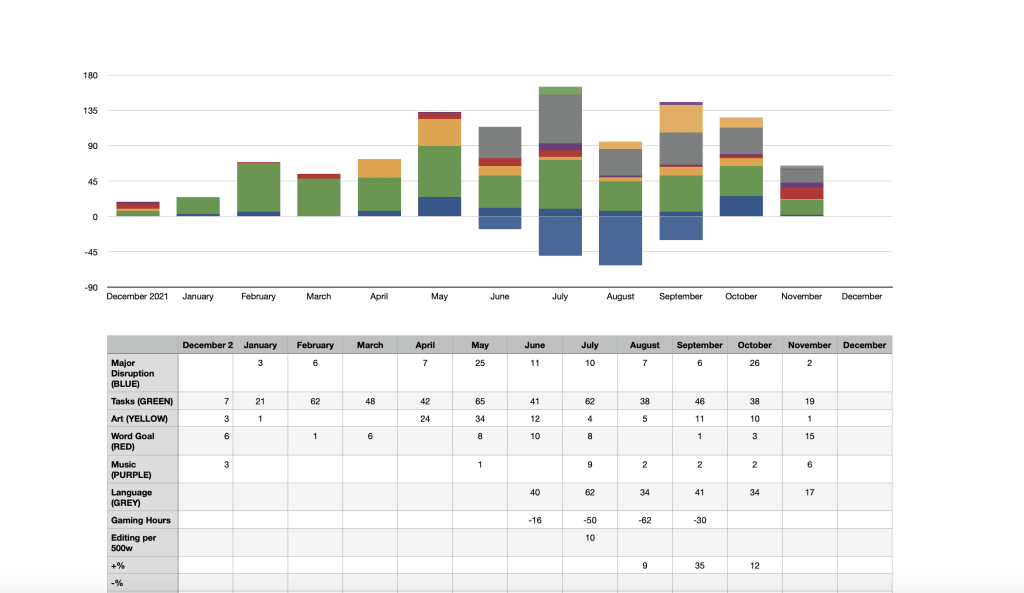
That’s the basic layout of the system, and it’s what I used up until September when I added a couple of new elements. It’s very simple, and I’m honestly not sure why it works when everything else didn’t. It’s just too bad these apps aren’t specifically designed to do this, which can make this daily process a little clunkier than it needs to be. Until I figure out how to code my own Unschedule app or something though, this is the best I can offer.
The two other layers I’ve recently added to this are a randomizer and a percentage tracker, which are elements I added to try and keep me from procrastinating. It’s also been a good way of pointing out what I procrastinate on the most.
Every day I count up the number of things that need to be done (and the more extracurricular things that can be done) and use google’s random number generator to pick which task will be labeled as “critical” that day, which I mark in dark blue. There are two upsides to this. Not only does it not insist on routine, it makes routine impossible. It also makes sinking into a rut impossible without it being counted against me. I never do the same thing two days in a row, and that’s really made me expand my growing skillset.
If a critical task is procrastinated for a day, it lowers the score of that task by 1 and remains dark blue until I finally complete it. -1% may not seem like much, but I managed to procrastinate my music tasks for 16 days straight at one point, leading to a nearly 30-point decline in that category, and I’m still trying to claw myself out of that hole. Trust me, -1% a day is plenty to start off with if you decide to do it and you have procrastination issues.
Otherwise, if the task is completed, the score goes up by 1%. I also increase the score when I put extra effort into a task, even if that just means I did 1 extra minute of exercise or wrote 100 more words than I’d wanted to during a writing session. The +1s ought to count, and they pile up just the same as the procrastination points do. It turned out to be a great way for me to visualize my successes and failures, my strong and weak areas, and that makes a big difference when trying to target the weak links that I otherwise wouldn’t have noticed much. It encourages me to just put 1% more effort into what I’m already doing. Since September, the total score has gone up just over 100%. It’s not a perfect representation of exactly how much better I am now than I was then, but it’s good enough to tell me I’m heading in the right direction.
Like the graph measurements, it doesn’t really matter how exactly you decide to give and take % points so long as you’re consistent. Personally, I’m slowly making it harder to gain them and easier to lose them just to provide a constant source of challenge for myself. I change it about every three months or so, as soon as the system I’m using starts to feel a little too easy.
I don’t know if this will ever help anyone other than myself, but I know I’m not the only creative who deals with these kinds of issues. Consistency, goals, finishing projects, falling into ruts, etc. They’re the plagues of a lot of people, but seem to especially target creatives. Normal schedules just don’t seem to cut it since we work more on inspiration than on routine, which is not necessarily a good thing, mind you, but it seems to be easier for me to evoke inspiration with this system than it had been before. I couldn’t tell you why that is. All I can say is that it appears to be working, and that’s good enough for me.
4 Responses
Thank you so much for taking the time to put this strategy together. Organization, consistency, not procrastinating, and (my particular fault) making unfair/nonapplicable comparisons are the detriment to many and more.
I’m going to seriously consider implementing your system, or something very close. I hope that it becomes one additional tool to help me stave off crippling self criticism and depression. If it does, I’ll be sure to give you credit for keeping my head on my shoulders (literally!).
Thanks again. I wish you success in all your endeavours.
I hope that one of the ideas here will be of aid to you, even if the system I use in its entirety isn’t all that useful. Taking small ideas from a hundred sources is how I made this, so anything here that’s helpful to others in even a small way is a success in my book. I hope you will find a way to distance yourself from the microscope of self criticism. As helpful as it is for reflecting on oneself and analyzing past choices, it sure gets heavy to lug around if used 24/7.
Fascinating. Daniel has very similar challenges and honestly, without commitments to force the time blocking (and putting out one fire after the next), I am pretty lost myself. So, the root of this problem besides personality and homeschooling was me working and homeschooling, trying to juggle it all and leaving you two to your own devices more than a well managed routine and peaceful days. My massive focus on constant productivity was unhealthy. But what the world does, especially the purpose of institutional education, which does have its good points, is trains up a child to become a good employee. Kids/ people do thrive on routine because we don’t have to make a decision for every single thing we do. That becomes exhausting. When we take a shower, we usually have a routine for grabbing a washcloth and towel, turning on water to warm, washing face first with a certain cleanser, shampoo hair, condition, dry, clothe, etc. We have more routines than we realize and can beat ourselves up for not being productive enough. But there are other things that are no so simple to routine up. We have to figure out what works for who we are, to achieve what we’re trying to achieve without feeling like we’re constantly behind and failing.
Daniel asked me the other day how I could just work, focused, all day when I wanted to. It made me realize what a struggle it is for him to focus for long periods yet there are things I struggle to focus on too. I’d like to better understand what you’re doing and see if it’s something I can integrate into my planning too.
Yeah, co-ops were vital for me and Daniel to get anything serious done lol. Our whole family had a very unique situation between school and what you and dad had to do to support us financially. Every family has their own weird challenges, and routine is ours.
It might take Daniel a while to figure it out, just as it’s taking me a while, but I think both of us will eventually get the hang of it in time, and we’ll probably both end up solving the issue in different ways. I lose my marbles doing the exact same thing every day / every week, so I had to just stop trying to force myself into doing that and embrace the more random order that’s more natural to me in a way that still manages to be productive. Making the disorder productive was the tricky part, but it can be done.